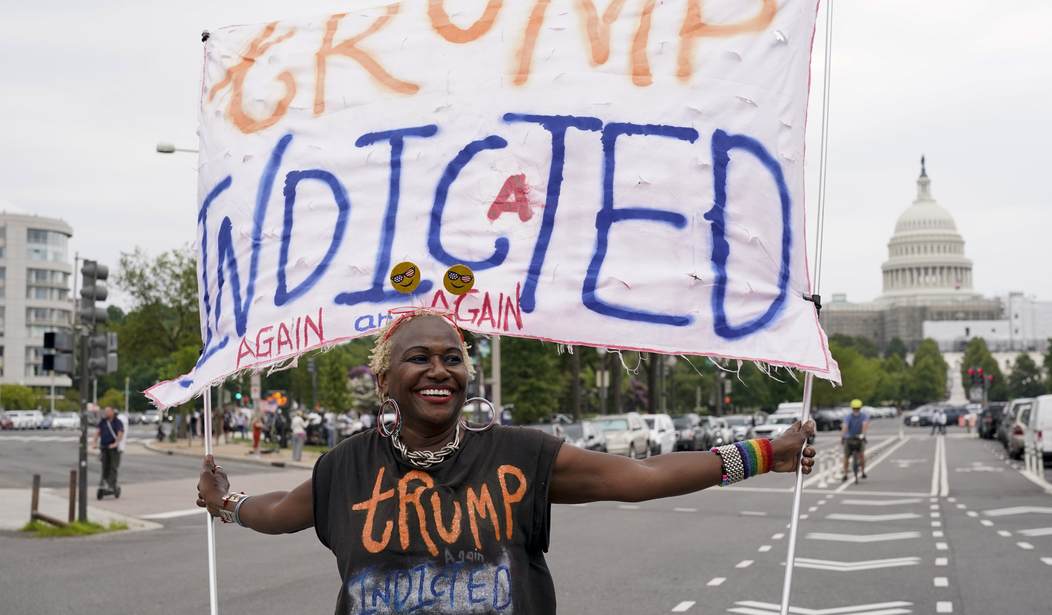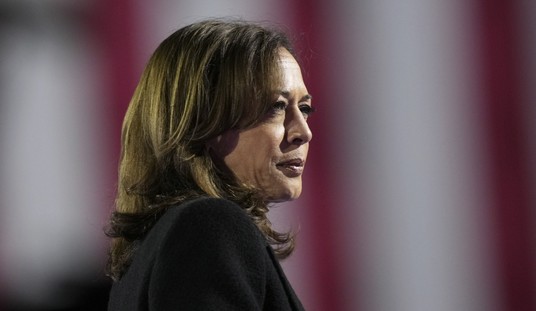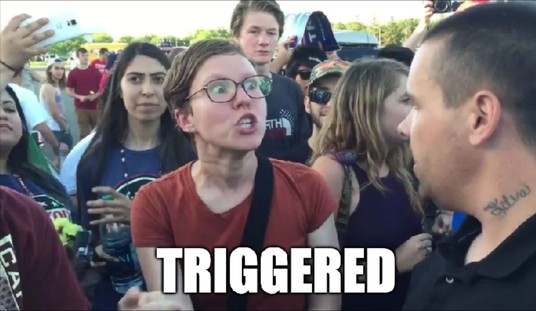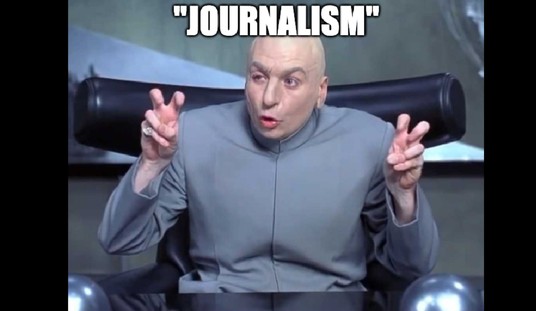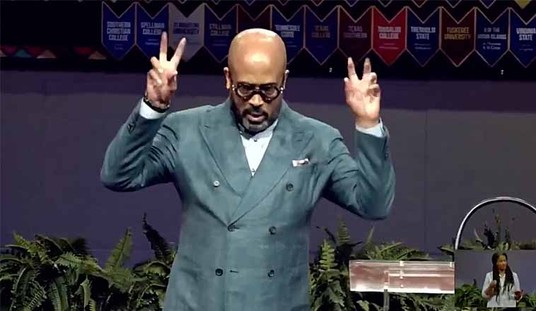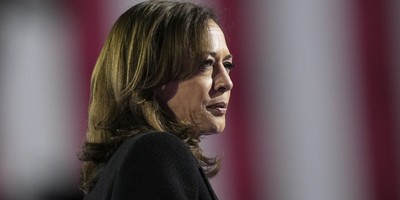I don’t think at this point anyone doesn’t know about the latest charges against Trump, and I don’t think I have to tell you that they are bogus, politically-motivated crap. If you need someone to explain it to you, Jonathan Turley is always good for that:
The Daily Beast is out with my column on the Georgia indictment and the risks for Donald Trump. It has “legs” as an indictment that is not likely to be dismissed in its entirety before trial. https://t.co/3z2wyTgGPI
— Jonathan Turley (@JonathanTurley) August 15, 2023
But all of this made me think a bit and I think I am seeing a bigger picture. Take David French. He posted this last night:
Viewpoint discrimination is unlawful. Whatever rights you give to BLM protestors will apply to pro-life activists as well. https://t.co/OQIbcOkUgp
— David French (@DavidAFrench) August 15, 2023
This isn’t wrong. The Supreme Court has repeatedly made it clear that under the First Amendment, viewpoint discrimination is forbidden. And yet French hasn’t said a peep about the viewpoint-motivated prosecutions of Donald Trump. So French isn’t wrong to denounce this viewpoint discrimination in the enforcement of essentially anti-graffiti laws. He is just hypocritical not to also denounce it with respect to Trump. I guess some viewpoint discrimination is better than others.
And the thing is, I think he understands he is being hypocritical. I don’t know how he could even pretend not to see the problem with the Trump prosecutions. He just doesn’t care.
And even if a person doesn’t understand that viewpoint discrimination is forbidden under the First Amendment, most people know it's not a good idea to have politically motivated enforcement of the laws. If Joe Biden said tonight that from now on the FBI will only enforce the criminal law if the accused was a Republican, I believe that even his own party would reject that—wholly apart from what the courts would say. So, they have to at least pretend they are being neutral. But I don’t think anyone who is not at least moderately engaged thinks this is a politically neutral investigation.
And, of course, we all know that there is a full-on campaign to protect the Bidens from the growing corruption scandal. We are at the point where any person who is at least moderately informed, moderately intelligent, moderately worldly knows what is almost certainly happening here, even if we can’t prove it. This was bribery. Hunter Biden would get the money and give it to his father, skimming a great deal off the top. And specific requests for Joe Biden to do a specific thing didn’t go to Joe, at least not directly. They would go to Hunter. And then Hunter goes to Joe and tells him what he needs to do. Maybe the conversation is something like ‘hey, Dad, the executives at Burisma need you to get this prosecutor fired or else I will lose my job, there.’ Or maybe it is ‘hey, Dad, I need you to get that prosecutor fired.’ In other words, maybe he doesn’t say explicitly that this is part of his deal with Burisma. Maybe Joe doesn’t even know who specifically is making the request, but Joe knows that he has to do it, to keep the gravy train going.
In other words, I think chances are that these conversations are only between Joe and Hunter. Indeed, at this point it might be that they don’t have to be too explicit about the quid pro quo that will happen. They already know. And if that is true, proof would probably depend on either Joe confessing, or Hunter rolling over on his father and turning states’ evidence. Both scenarios are unlikely, so we might never be able to prove it. But we know what happened.
And, certainly, every politician in Washington understands that this is what was going on. There isn’t a single Democrat or Republican on the Hill who don’t know the score.
This is why the Biden administration is doing everything it can to make sure Hunter doesn’t face any real consequences for his misconduct. And certainly no one is saying to him, ‘tell us about your dad and we will go easy on you.’ The actual policy appears to be ‘don’t rat on your dad, and we will go easy on you.’ And the Special Counsel appointment looks like it is a joke. It doesn’t even appear to be legal. Here’s former prosecutor Andrew McCarthy speaking on the special counsel appointment:
🚨Andy McCarthy SLAMS the appointment of a David Weiss as a special counsel to investigate Hunter Biden:
— Charlie Kirk (@charliekirk11) August 11, 2023
"This is a SHAM...This is the Biden Justice Department's vehicle for maintaining control of an investigation they're not pursuing." pic.twitter.com/SICYjeDKKY
He alludes specifically to 28 C.F.R. § 600.3(a), which lists the specific qualifications for the special counsel. (C.F.R. refers to Code of Federal Regulations.) It says in relevant part that
An individual named as Special Counsel shall be a lawyer with a reputation for integrity and impartial decision-making, and with appropriate experience to ensure both that the investigation will be conducted ably, expeditiously and thoroughly, and that investigative and prosecutorial decisions will be supported by an informed understanding of the criminal law and Department of Justice policies. The Special Counsel shall be selected from outside the United States Government. Special Counsels shall agree that their responsibilities as Special Counsel shall take first precedence in their professional lives, and that it may be necessary to devote their full time to the investigation, depending on its complexity and the stage of the investigation.
(Boldface added.) As a rule, when you see the words ‘shall’ or ‘shall not,’ that means that this is not a discretionary decision: The people involved have no choice: They either have to do the thing, or they absolutely cannot, respectively. So, with that understanding in mind, they are saying that the Attorney General cannot appoint anyone currently working for the United States (federal) government. So, a current prosecutor is disqualified. Now, you might arguably get around that by having the person quit their federal job, first, but reportedly that hasn’t happened. So, by their own regulations, Weiss can’t be special counsel.
And is that an accident? An oversight? Or an intentional timebomb built into this, giving Hunter Biden a basis to challenge any prosecution that is brought? We can't know for sure, but I have my suspicions.
So, the Democrats are going hard trying to criminalize Trump because he is the political enemy and they are looking the other way at the Biden corruption. And I think these things are connected and the reason for doing this goes beyond normal politics.
‘Vote for the crook. It’s important.’ That is a phrase from a popular bumper sticker during a pretty low point in Louisiana politics. In 1991, much to the embarrassment of the Republican Party, David Duke was their nominee for governor of Louisiana. The rules prevented the Republican party in Louisiana from stopping him from being the nominee when he won the primary, but the official party denounced their own nominee, as did most republicans national or local. The Democratic nominee was Edwin Edwards, widely believed to be a crook at the time (he was eventually convicted of crimes such as extortion). So, Louisianans were forced to choose between a man associated with a literal terrorist organization (Duke) who is definitely a vicious racist, and a man believed to be a crook. That bumper sticker reflected in a tongue-in-cheek way that awful choice.
Democrats have worked themselves up to think that Trump threatens the entire system. They claim over and over again that Trump represents a threat to democracy. (Or the Republic, if you want to get persnickety in your terminology.) They have worked themselves up to think Trump wants to literally be a dictator or something like that.
Naturally, the January 6 riots play into that. On January 6, Democrats (and a few Republicans) literally believed that Trump was somehow responsible for the riots and this was a genuine plan to take over Congress and install himself as president for life, or something. But, of course. after years of investigation, they never established any legal responsibility for the riot on Trump's part, but they can’t be shaken from their belief.
It is their Reichstag Fire. Many people use ‘Reichstag Fire’ as shorthand for a false flag operation but I’m not using that term that way right now. Whether the Reichstag Fire was set by an actual communist as the Nazis claimed, or by Nazis as many historians now claim, the effect was the same: The Reichstag Fire was used as an excuse to destroy the Weimar Republic. The Nazis took a reasonable sense of anger at an attack on a pillar of the Republic and channeled it into the destruction of the Republic. With the Nazis, one might suspect that it was their plan all along. With Democrats, one might argue that they are simply blind to what they are doing.
So, every January 6 rioter has to have the book thrown at them. Mind you, there was a year of rioting before January 6, 2021. There was even an attack on the White House during those George Floyd riots, but those rioters were not treated like the ones who attacked Congress. And there were even previous riots designed to prevent the transfer of power. On January 20, 2017, Democrats rioted in D.C. and, on its face, this was an attempt to keep Trump from taking the oath of office that day. But none of those prior rioters weren’t treated the same as the January 6 rioters, because they didn’t burn the Reichstag.
It also follows that they have to charge Trump with anything they can throw at him. They only need one activist judge and one prejudiced jury and you get him thrown in prison. And get ready for the next shoe to drop as election officials across America will start to say Trump can’t even be on the ballot because he supposedly committed insurrection under Section 3 of the Fourteenth Amendment. They aren’t going to wait for a conviction to do it and who knows if saner judges put a stop to it in time before it effects the election. Who cares if they are bending the law past the breaking point? The Reichstag was on fire, after all and we have a Republic (or Democracy) to save!
It only follow, then, that they have to cover for Biden’s obvious corruption. If it is important to vote for the crook, then it is probably a good idea for the American people to be kept from understanding that Biden is a crook in the first place.
Michael Shellenberger put his finger pretty close to the issue and the fatal flaw in the argument this morning when he said this:
Democrats say January 6 proves Trump is a threat to democracy, but it doesn't. Lack of security was the underlying cause of the J6 riot. The real threat to democracy is the Democrats' effort to criminalize their opponents, which is driven by their fear & loathing of the masses. pic.twitter.com/CF2e524nB8
— Michael Shellenberger (@shellenberger) August 16, 2023
What he is getting at is that a great deal of this is projection. Whenever someone says that Trump or the Republican party is a danger to democracy (or the Republic), I ask them this: ‘In 2016, which party nominated a person for President who wanted to make it a crime to make a movie criticizing a Presidential candidate?’
In context you might guess the answer: It was the Democrats and the nominee was Hillary Clinton. And every word I have said about her is undeniably true. Allow me to explain.
That was what Citizens United v. F.E.C., 558 U.S. 310 (2010) was actually most directly about. Citizens United, an organization apparently dedicated to free speech, had made a movie called ‘Hillary: The Movie’ which was highly critical of Mrs. Clinton and the question is whether it was a crime to make that movie and release it close to a primary.
And that is almost certainly not what you have heard about the case. The amount of lying about this case is nothing less than stunning. So, if you don’t believe what I am telling you about the case, read it. The law would have made the movie itself a crime if it was upheld. For instance, I consider this passage from the opinion to be critical:
The law before us is an outright ban, backed by criminal sanctions. Section 441b makes it a felony for all corporations — including nonprofit advocacy corporations — either to expressly advocate the election or defeat of candidates or to broadcast electioneering communications within 30 days of a primary election and 60 days of a general election. Thus, the following acts would all be felonies under § 441b: The Sierra Club runs an ad, within the crucial phase of 60 days before the general election, that exhorts the public to disapprove of a Congressman who favors logging in national forests; the National Rifle Association publishes a book urging the public to vote for the challenger because the incumbent U.S. Senator supports a handgun ban; and the American Civil Liberties Union creates a Web site telling the public to vote for a Presidential candidate in light of that candidate's defense of free speech. These prohibitions are classic examples of censorship.
The dissent didn’t dispute this interpretation of the law: They were simply fine with all of it.
One attack on that decision is to say that it held that money is speech and that is wrong. But, in fact it, didn’t. That principle was set down decades ago in Buckley v. Valeo, 424 U.S. 1 (1976). I have always been a little critical of that decision in the sense that it doesn’t do a very good job explaining itself. I think the first problem is that they talk about it in terms of Freedom of Speech.
The better way to talk about it is Freedom of the Press which I and the Supreme Court interpret as nothing more than the right to express yourself in written form. Freedom of Speech, at the beginning of the Republic was inherently limited by how loud you can shout. But Freedom of the Press was always mass media and it always depended on money. Ink costs money. Paper costs money. So, creating a newspaper—long considered a core protected form of expression, absolutely necessary for a free Republic—requires money. You will need money to distribute it, whether it is by hiring humans to hand them out, or buying stamps to send it through the mail. And if you can charge something to each person receiving it, then you can get some income back to either help increase the reach of your paper, or help to finance tomorrow’s edition. (And, of course, I haven’t even gotten into advertising.) You can say the same thing about a pamphleteer or a person who just wants to self-publish a book. And the fact that money is necessary to exercise Freedom of the Press remains true in our digital age. Think of how many people had to spend and receive money just to allow you to read what I am writing right now.
I would even say that modern video/film more resembles the press as it existed in the 1790’s than speaking. Yes, it is images and sounds, but it costs money to store the images and sound. Unlike a guy speaking on a street corner, those words can be edited after the fact—just like the words written on paper. And the image and the sound can even be manipulated after the fact. For instance, here’s a moment from the classic Galaxy Quest:
In that scene, they needed to fix something in the engine and it turned out to be ridiculously dangerous to get to it, which prompts Sigourney Weaver’s to talk about noping out of there. As you watch it, though, read Sigourney Weaver’s lips. She is not saying ‘screw that.’ She is saying the f-bomb—which frankly is funnier. And the reason why her lips don't match what you hear is because originally, they were shooting for an R rating, but as things went on, they decided to shoot for a PG-13 rating instead. So rather than reshoot the entire scene, they just had Weaver say something different in a recording studio and edited it in, figuring only good lip readers would notice.
My point is that while on the surface, a movie like Galaxy Quest or an ad for a political candidate might just look like just ‘speech,’ because it involves people talking, but if you look at the back end, it actually looks more like ‘press’ because it requires money and (typically) multiple humans working together, creating a highly edited product.
I don’t say that to put it down, but to show how money is vital to that form of expression and how regulating money can have the effect of regulating expression. If Congress passed a law in 1801 saying ‘no person can buy ink or paper if they intend to use it to publish a writing criticizing President Jefferson,’ every sane person would agree that this violates the Free Press Clause of the First Amendment. The notion that being able to spend and receive money freely is obvious in the case of Freedom of the Press. But in Buckley, they simply asserted that money is speech without explaining any of this, and I think that is a mistake.
But it doesn’t mean they were wrong to say that expression—especially in modern times—depends on money. And therefore Freedom of Expression depends on a certain amount of freedom to spend money and to receive money.
As for Citizens United, they were confronting a different problem. With the McCain-Feingold legislation, Congress had said, more or less, ‘well, if you think money is speech, then speech is money and we can regulate speech as we do campaign cash.’ Buckley had still allowed some restrictions on how much money you can donate to political causes and candidates, so Congress thought this gave them the go ahead to regulate actual direct expression.
Another argument against the decision is that supposedly corporations have no right to Freedom of Expression. I would ask the people who make that argument: When was the last time you consumed any art or entertainment that wasn’t corporate in some sense? Virtually every song on the radio is published by a corporation. Virtually every movie you see is created by one. Virtually every book you read is published and sold by corporations. Indeed, one would be hard pressed to find a single newspaper in America that is not run by a corporation. Would you really argue that none of that expression is protected by the First Amendment?
And the issue isn’t really whether the corporation has the right to free expression. A corporation is, when you strip it down, nothing more than an association of people. I suppose someday there might be a corporation that is 100% run by robots, but I’m pretty sure that won’t even be possible for at least a decade. So, we are not talking about silencing a corporation but silencing a person because they are associated with a corporation. A corporation doesn’t speak for itself, except through a human employee or a contractor. Even when they used AI to create Luke Skywalker’s voice in the Book of Boba Fett, it was still a human deciding what he would say. Paramount didn’t create Top Gun: Maverick. A large number of human beings (actors, writers, a director and a crew) working for or with Paramount did. And if Tom Cruise wanted to take five minutes in the movie to lecture the audience about how you should vote for or against a particular candidate in a particular election, there should be no question that it would be his legal right to do so. I admit I am pretty sure I wouldn’t enjoy watching such a thing, but if Cruise and Paramount wanted to do it, whenever they wanted to do it, it is their right.
But not in Hillary Clinton’s mind. This is what she said about the case:
And let’s remember, Citizens United, one of the worst Supreme Court decisions in our country’s history, was actually a case about a right-wing attack on me and my campaign. A right-wing organization took aim at me and ended up damaging our entire democracy. So, yes, you’re not going to find anybody more committed to aggressive campaign finance reform than me.
Free speech damages our democracy, according to Hillary and because she was personally criticized, she will do her best to overturn it. She tries to make it sound like it’s a good thing, but when you realize what she is actually saying, it is chilling.
And here she is promising to overturn Citizens United by constitutional amendment or by Supreme Court appointment:
And as you will recall, on election day of 2016, we only had eight justices on the Supreme Court. Four of them had dissented in Citizens United. Scalia had died and Merrick Garland—who we know now is a political hack who has no problem with viewpoint discrimination—was nominated to the bench. If Clinton had won and Trump lost, we would be talking about Supreme Court Justice Garland and I have no doubt he would have been a fifth vote to overturn Citizens United. And of course, Clinton might have had a chance to replace both Kennedy and Ginsburg, if she had won the Presidency.
Now, Trump is no great advocate of Freedom of Expression. He has said some things I disagree with very deeply on the subject. But his judicial appointments have left the First Amendment more secure than it has been in years. For instance, just last term three ‘liberal’ justices thought that it was appropriate under the First Amendment to force a person to say things that they don’t agree with on their website. If Hillary had been president from 2017-2021, that probably would have been a 5-4 decision in favor of actually forcing people to say what they don’t believe.
And I told you about the ongoing Missouri v. Biden litigation where the federal government has been using its power to bully the social media platforms into censoring speech. There is a very good chance that this will end up in the Supreme Court and the only reason why we have a chance of winning this fight against Internet censorship is because Hillary Clinton lost in 2016. Frankly, things would be even better if Trump had won in 2020.
Even now, Democrats justify Internet censorship, arguing that somehow letting ordinary citizens decide what the truth is for themselves is a danger to Democracy (the Republic). But President John F. Kennedy knew better, saying once that:
We seek a free flow of information across national boundaries and oceans, across iron curtains and stone walls. We are not afraid to entrust the American people with unpleasant facts, foreign ideas, alien philosophies, and competitive values. For a nation that is afraid to let its people judge the truth and falsehood in an open market is a nation that is afraid of its people.
But, of course, these days that’s exactly the Democratic view: They are afraid of the people.
And do I have to tell you that Freedom of Expression is a necessary ingredient in a Republic? The syllogism isn’t that complicated. If you have a right to vote, you have a right to make an informed decision. In order to make an informed decision, you have to be able to receive information from others. Most of us wouldn’t know anything that was happening in the world without someone else telling us—for instance, the only reason why I know there is a war in Ukraine is because other people (including the people on news websites) have told me. It's not like I can see it looking out my window. In order to receive information from others, everyone needs to be able to speak freely. So, when you attack Freedom of Expression, you attack the entire concept of free elections.
So, who really is the danger to the Republic—or a danger to democracy, as Democrats put it? One guy, or an entire party dedicated to making it a crime to make a movie that says certain things? The party that thinks it is okay to try to use lawfare to prevent the American people from choosing their own President freely? The party that doesn’t want you to know about the obvious corruption in the Biden presidency, because they don’t want to have to explain rationally why they think you need to vote for the crook?
They say they are concerned about threats to the Republic (or to democracy), but it seems to be projection all the way down. At the very least, they have reached the ‘We have to destroy the Republic in order to save it,’ stage of their thinking.
A few paragraphs back, I imagined a law passed during the Jefferson Presidency that would have blatantly violated the First Amendment. But any person versed in history was probably already thinking of the actual violation of the First Amendment that happened a few years before, with the Sedition Act, which was read by the courts as banning all criticism of the current government—even if it was true. And in 1800 it is argued that America had a second revolution, a.k.a. The Revolution of 1800, not by bullets but by ballots. The revolutionaries didn't overthrow the government by the use of guns, but simply threw them out with their votes. The election of Jefferson was seen as a rejection of that unconstitutional law, even more so when Jefferson pardoned everyone convicted of violating it. We need a similar revolution by ballots in 2024. It won’t solve all of the problems—two of the prosecutions against Trump are in state courts, for instance—but it will help to repudiate those tactics.
----------------
By the way, the approach of the dissent took in Citizens United was to say that of course this law couldn’t be used to censor newspapers or books, because the book companies and the newspaper companies enjoyed Freedom of the Press… and no one else. A regular guy writing on his blog, even a regular person writing on Twitter, would have no right to Freedom of the Press. And apparently a company making a movie didn’t, either. We have always said that this can be rebutted by considering common sense. Or more like Common Sense, the revolutionary pamphlet put out by Thomas Paine. According to the dissenters, Mr. Paine’s pamphlets were not protected by the young republic, even though there is little doubt that the founders of the First Amendment would be horrified at the thought that Paine could be suppressed. In any case, that is thankfully a minority view, which is at most only held by three Supreme Court justices today.


















